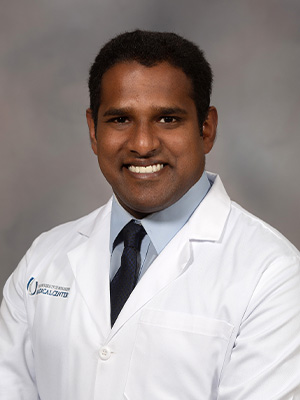
Investigator highlight: Dr. Toms Thomas
Published on Wednesday, August 10, 2022
Dr. Toms Thomas is an assistant professor of radiation oncology in the UMMC Cancer Center and Research Institute. As well as work with patients and his research at UMMC, Thomas also has served on committees for the American Medical Association and the American Society for Radiation Oncology (ASTRO).
How long have you worked with your current organization, and what type of research do you do?
I started working as a trainee at the Department of Radiation Oncology in July, 2015. I have completed my residency and fellowship here and am currently working as assistant professor, making it a total of seven years. I mainly treat head and neck cancers and breast cancers.
I have a few research interests, including using artificial intelligence (AI) in oncology, financial toxicity of cancer care, cancer care disparities and workflow-process improvements. I am a big fan of systematic reviews and meta-analysis projects.
Would you describe your most recent research and/or publications? How does your recent research and/or publications relate to your overall research within cancer?
In this systematic review and meta-analysis (publication, PMID: 35240112), we analyzed the available data on treating the primary tumor in patients with metastatic cancer at diagnosis. This is a common question and discussion when our cancer care teams meet. We found patients with metastatic cancer showed no consistent improvement in survival when the primary tumor was aggressively treated. Carefully selected patients (esp: prostate cancer or nasopharyngeal cancer) may benefit from treating the primary tumors aggressively, and those patients should be chosen carefully after their cancer care team discusses all aspects of the proposed care. Patients who would not benefit from aggressive treatment could be offered palliative care.
In another recent publication, "Access, Affordability, and Sustainability: Barriers to High-Quality Care in a High-Income Country," we share our perspective on the financial toxicity of cancer care in the United States as a part of a global oncology theme issue. We start with an eagle-eye view of the payment system in the U.S. health care system. We provide an in-depth review of the disparities in cancer care access and affordability, followed by an assessment of the sustainability of the ever-growing health care cost. We tried to provide a few suggestions for improvements. This article will be a good short read for everyone.
What inspired your most recent research and/or publications?
I was fortunate to have the opportunities with a few international experts in my most recent projects, which aligns with my interests in cancer care research. The cancer care costs are growing exponentially every year along with the advancements in cancer care, leaving many families bankrupt. This financial toxicity leads to worsening pre-existing disparities in cancer care. Financial toxicity is an " elephant in the room" when you are with the patient, which physicians may not be able to address, given the complexity of each situation. I believe an improvement in awareness among physicians about the financial toxicity of cancer care will help us to help our patients better.
What advice can you give medical students and/or high-school students who are interesting in pursuing a career in research?
I believe it is important to start early and not be afraid to reach out. Many times, I may have a project or an idea that I am not currently pursuing due to the lack of time. So, if a motivated student comes along, I am happy to train them on the skill sets needed for the projects, and those research skill sets will help them over their lifetime. It is important for students to have open conversations about their goals and time commitments upfront with their mentor. They should be aware that a lot of the research projects will take a significant amount of time to get to publication, and they need patience and perseverance to ensure that both the mentor and student are reaching their goals.
Follow Dr. Thomas: @Dr_TvThomasMD


